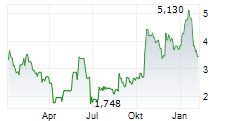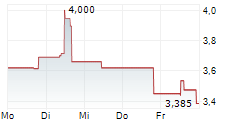120-Day Safety Update Submitted to FDA
ORCA-OL Long-Term Safety Trial Successfully Concluded
DSMC Completes Final Review of Cytisinicline, Finds No Drug Safety Concerns
SEATTLE and VANCOUVER, British Columbia, Nov. 03, 2025 (GLOBE NEWSWIRE) -- Achieve Life Sciences, Inc. (Nasdaq: ACHV), a late-stage specialty pharmaceutical company focused on the global development and commercialization of cytisinicline as a treatment for nicotine dependence, today announced several milestones in its ORCA-OL long-term safety trial supporting the New Drug Application (NDA) review process of cytisinicline for smoking cessation.
- 120-Day Safety Update: The company has submitted the 120-day safety update to the U.S. Food and Drug Administration (FDA) as part of the NDA review for cytisinicline. This update provides the most current and comprehensive long-term safety data available and includes data on 411 participants with at least six months of cumulative cytisinicline exposure and 214 participants with at least one year of cumulative cytisinicline exposure as of the agreed upon data cutoff on June 4, 2025.
- ORCA-OL Trial Completion: Achieve reported that the last participant in the ORCA-OL long-term safety trial completed treatment in October 2025, marking 334 participants who finished one full year of cytisinicline treatment. This level of participation exceeds FDA's request for cumulative cytisinicline safety data of at least one year from 100 participants and at least six months from 300 participants before approval.
- Data Safety Monitoring Committee (DSMC): The company announced completion of the fourth and final scheduled safety review by the DSMC for the ORCA-OL trial. Adverse events were mostly mild in severity, and no serious adverse events were deemed to be treatment related. The DSMC found no concerns with respect to drug safety.
"The completion of the final DSMC review, along with robust long-term safety data from the ORCA-OL trial, bolsters the safety profile of cytisinicline across our clinical development program. Having reached these critical milestones and submitted our 120-day safety update to FDA, we are well positioned in the regulatory process to potentially deliver the first new FDA-approved treatment for smoking cessation in nearly two decades," said Dr. Mark Rubinstein, Interim Chief Medical Officer of Achieve Life Sciences.
"The ORCA-OL trial had strong participation, with 334 individuals completing one year of cumulative treatment, significantly exceeding the number of patients required for FDA review. This high-level of retention is a potential testament to cytisinicline's tolerability and offers valuable insight into the role cytisinicline may play in addressing nicotine dependence," said Rick Stewart, Chief Executive Officer of Achieve Life Sciences.
About the ORCA-OL Trial
ORCA-OL is an open-label trial designed to evaluate the long-term exposure of 3 mg cytisinicline dosed three times daily in adults 18 years or older seeking to quit smoking or vaping. The trial was conducted at 29 clinical sites across the United States and was designed to satisfy the FDA's requirement for cumulative safety data of at least six months from 300 participants and one year from at least 100 participants for NDA review.
About Achieve Life Sciences, Inc.
Achieve Life Sciences is a late-stage specialty pharmaceutical company committed to addressing the global smoking health and nicotine dependence epidemic through the development and commercialization of cytisinicline. In September 2025, the company announced that its New Drug Application, submitted to the U.S. Food and Drug Administration (FDA) in June 2025, had been accepted for review. The FDA has assigned a Prescription Drug User Fee Act (PDUFA) date of June 20, 2026. The NDA is for cytisinicline to be used as a treatment of nicotine dependence for smoking cessation in adults, based on two successfully completed Phase 3 studies and its open-label safety study. Additionally, the company has completed a Phase 2 study with cytisinicline in vaping cessation and conducted a successful end-of-Phase 2 meeting with the FDA for a future vaping indication.
About Cytisinicline
There are approximately 29 million adults in the United States who smoke combustible cigarettes.1 Tobacco use is currently the leading cause of preventable death that is responsible for more than eight million deaths worldwide and nearly half a million deaths in the United States annually.2,3 More than 87% of lung cancer deaths, 61% of all pulmonary disease deaths, and 32% of all deaths from coronary heart disease are attributable to smoking and exposure to secondhand smoke.3
In addition, there are approximately 17 million adults in the United States who use e-cigarettes, also known as vaping.4 In 2024, approximately 1.6 million middle and high school students in the United States reported using e-cigarettes.5 There are no FDA-approved treatments indicated specifically as an aid to nicotine e-cigarette cessation. FDA has awarded the Commissioner's National Priority Voucher for e-cigarette or vaping cessation and granted Breakthrough Therapy designation to address this critical need.
Cytisinicline is a plant-based alkaloid with a high binding affinity to the nicotinic acetylcholine receptor. It is believed to aid in treating nicotine addiction for smoking and e-cigarette cessation by interacting with nicotine receptors in the brain, reducing the severity of nicotine craving symptoms, and reducing the reward and satisfaction associated with nicotine products. Cytisinicline is an investigational product candidate being developed as a treatment of nicotine dependence for smoking cessation and has not been approved by the FDA for any indication in the United States.
Forward Looking Statements
This press release contains forward-looking statements within the meaning of the "safe harbor" provisions of the Private Securities Litigation Reform Act of 1995, including, but not limited to, statements Achieve makes regarding its expectation of market conditions and use of proceeds, the timing and nature of cytisinicline clinical development and regulatory review and approval, data results and commercialization activities, the potential market size for cytisinicline, the potential benefits, efficacy, safety and tolerability of cytisinicline, the development and effectiveness of new treatments, and the successful commercialization of cytisinicline. All statements other than statements of historical fact are statements that could be deemed forward-looking statements. Achieve may not actually achieve its plans or product development goals in a timely manner, if at all, or otherwise carry out its intentions or meet its expectations or projections disclosed in these forward-looking statements. These statements are based on management's current expectations and beliefs and are subject to a number of risks, uncertainties and assumptions that could cause actual results to differ materially from those described in the forward-looking statements, including Achieve's Annual Reports on Form 10-K and Quarterly Reports on Form 10-Q. Achieve undertakes no obligation to update the forward-looking statements contained herein or to reflect events or circumstances occurring after the date hereof, other than as may be required by applicable law.
Achieve Contact
Nicole Jones
VP, Strategic Communications and Stakeholder Relations
ir@achievelifesciences.com
425-686-1510
References
1VanFrank B, Malarcher A, Cornelius ME, Schecter A, Jamal A, Tynan M. Adult Smoking Cessation - United States, 2022. MMWR Morb Mortal Wkly Rep 2024;73:633-641.
2World Health Organization. WHO Report on the Global Tobacco Epidemic, 2019. Geneva: World Health Organization, 2017.
3U.S. Department of Health and Human Services. The Health Consequences of Smoking - 50 Years of Progress. A Report of the Surgeon General, 2014.
4Vahratian A, Briones EM, Jamal A, Marynak KL. Electronic cigarette use among adults in the United States, 2019-2023. NCHS Data Brief, no 524. Hyattsville, MD: National Center for Health Statistics. 2025. DOI: https://dx.doi.org/ 10.15620/cdc/174583.
5Jamal A, Park-Lee E, Birdsey J, et al. Tobacco Product Use Among Middle and High School Students - National Youth Tobacco Survey, United States, 2024. MMWR Morb Mortal Wkly Rep 2024;73:917-924.




